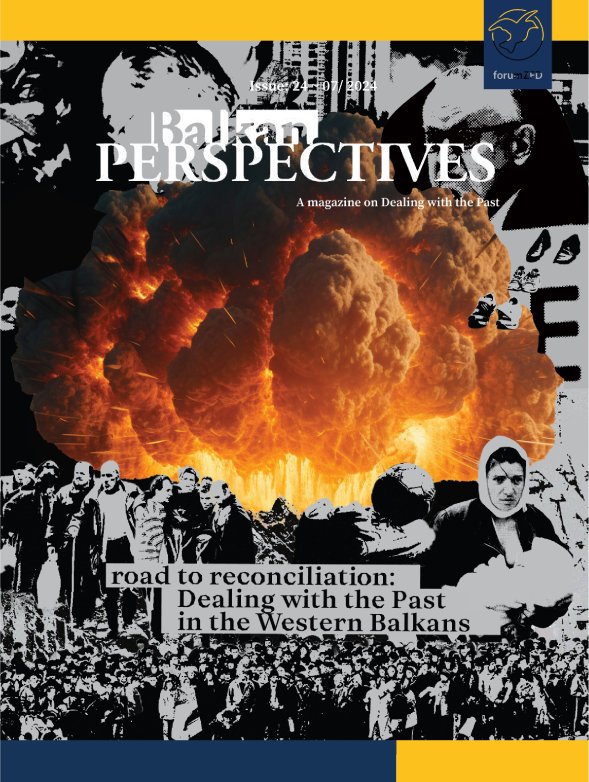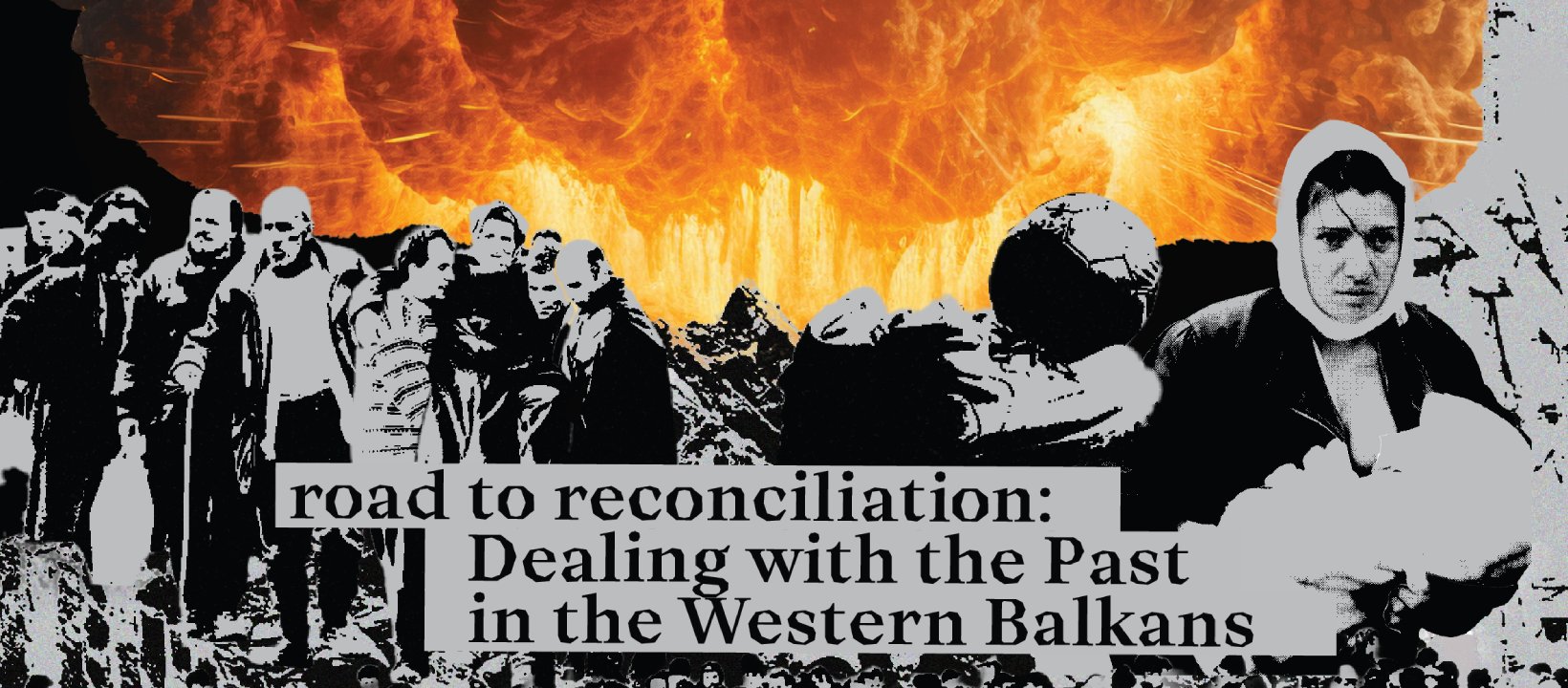

ISSUE 24
Balkan.Perspectives #24
Road to reconciliation: Dealing with the Past in the Western Balkans
This edition of the Balkan.Perspectives magazine examines a broad and diverse area: reconciliation through commemoration of the past events that put an everlasting imprint on the societies of the Western Balkans countries. Dealing with the heritage of war and conflict has proven to be a difficult point for productive discussion and search for the truth. The Balkan wars of the 1990s left deep scars, with war crimes and ethnic cleansing staining the collective memory of the region. Addressing these historical grievances is crucial for the road to reconciliation. Efforts such as the International Criminal Tribunal for the former Yugoslavia (ICTY) have played a pivotal role in seeking justice. Yet, these efforts often face resistance from nationalist factions and a populace reluctant to revisit painful memories. Local initiatives aimed at fostering dialogue and understanding among different ethnic groups have shown promise. Grassroots movements and NGOs work tirelessly to bridge divides, but there is a lack of political will.
Mirishahe Syla wites for this edition of Balkan.Perspectives that “We used to say, ‘We were lucky to be kids during the war,’ a sentiment shared among us sisters, now adults, as we reflect on the unnaturalness and cruelty of wars. It’s a stark realization of the ugliest form human power can take.”
This quotation serves us as a powerful reminder that the War and its consequences are inescapable part of the life, taking its toll later into adulthood. Reflecting as an adult, she realizes the deep psychological impact of the war and the painful acknowledgment that the trauma of war lingers long after the fighting stops. Naum Trajanovski also wrote about the Kosovo refugee crisis during 1999 in then Republic of Macedonia and the spillover effect. Around a quarter million Kosovar Albanians fled to Macedonia due to Yugoslav repression and NATO bombings. This refugee crisis strained Macedonia’s interethnic balance and security, especially after the withdrawal of the UNPREDEP peacekeeping force, which had promoted social trust and civil society. Merima Ražanica on the other hand, wrote about the Memorial practices that play a crucial role in post-conflict societies, reflecting on their confrontation with the wartime past and shaping future identities. The Siege of Sarajevo, the longest siege of a capital in modern warfare, saw significant civilian casualties, and its memorialization reveals socio-political dynamics and identity-building efforts. Hikmet Karčić reflects on The proposed United Nations resolution on the Srebrenica genocide, scheduled for mid-May, signifies a pivotal step in recognizing and commemorating this tragic event. Although the resolution lacks direct legal consequences, it holds symbolic importance by acknowledging the genocide and highlighting the international community’s commitment to preserving the memory of the victims. Dejan Ilić from Serbia gives its perspective on the unresolved “Kosovo issue” from 1990 to 2024, highlighting a continuous denial of facts and a fixation on an “authoritarian regime.” He discusses key events such as the Kumanovo Agreement, the Ahtisaari Plan, Kosovo’s declaration of independence, and various agreements with Kosovo, emphasizing Serbia’s refusal to acknowledge these developments. Jelena Lončar looks at the Kumanovo Agreement on the basis of the institutional reforms and guidelines for coexistence in Kosovo following the agreement, leading to ongoing tensions and unresolved issues. She criticizes the promotion of nationalist narratives by authorities in both Serbia and Kosovo, which she believes perpetuates divisions and prevents meaningful reconciliation. Agon Maliqi provides a thoughtful analysis of the challenges facing peacebuilding efforts in the aftermath of conflicts like the one in Kosovo. He draws parallels between his experiences in the Balkans and observations from other conflict regions, highlighting common themes of collective identity, historical grievances, and external security frameworks. Alban Bokshi’s report on the resurgence of ethno-nationalism in the Western Balkans offers a comprehensive analysis of the challenges posed by historical narratives in perpetuating conflict and division in the region. Drawing on insights from philosophy and political theory, Bokshi delves into the complexities of collective memory, identity formation, and the manipulation of history by political leaders.
We also have a new Balkan.Perspectives Podcast series for you. As usual, you can listen and download the podcasts via our website www.dwp-balkan.org or via your preferred streaming service like Spotify, Google Podcast, or Apple Podcast. We would like to thank our partners, the production team behind and in front of the microphones and our guests who contributed to the podcasts. In Bosnia and Herzegovina, we thank Nihad Kreševljaković and tačno.net. In Kosovo, we thank Serbeze Haxhiaj and Alban Bokshi. In North Macedonia, we thank Radio MOF and David Geere. In Serbia, we thank Dragan Popović and Liceulice FM – RadioAparat. For this edition of the magazine, we are happy to announce our regional podcast, prepared by RadioMOF in North Macedonia with guest speakers Naum Trajanovski, Lejla Gačanica and Sofija Todorović.
The Balkan.Perspectives editorial team wishes you an enjoyable reading and hearing experience.
On behalf of the Balkan.Perspectives editorial team.
Martin Filipovski
Editor-in-Chief
Impressum 24 – 07/2024
Editor in Chief: Martin Filipovski
Editorial Team: Martin Filipovski, Vjera Ruljić, Alexander Vojvoda, Zlatan Hajlovac
Authors: Mirishahe Syla, Naum Trajanovski, Dejan Ilić, Jelena Lončar, Agron Maliqi, Alban Bokshi, Merima Ražanica, Hikmet Karčić
Podcasts: Bosnia and Herzegovina: Nihad Kreševljaković for Tačno.net, Kosovo: Alban Bokshi for forumZFE, North Macedonia: RadioMOF and David Geere, Serbia: Dragan Popović, radio show Liceulice FM na RadioAparatu.
Design: Envinion
Translation: PLC Lingua (Albanian), Luna Đorđević (BHSC), Martina Kimovska (Macedonian)
Proofreading: PLC Lingua (Albanian/ English), Zinaida Lakić (BHSC), Žanet Ristoska (Macedonian).
